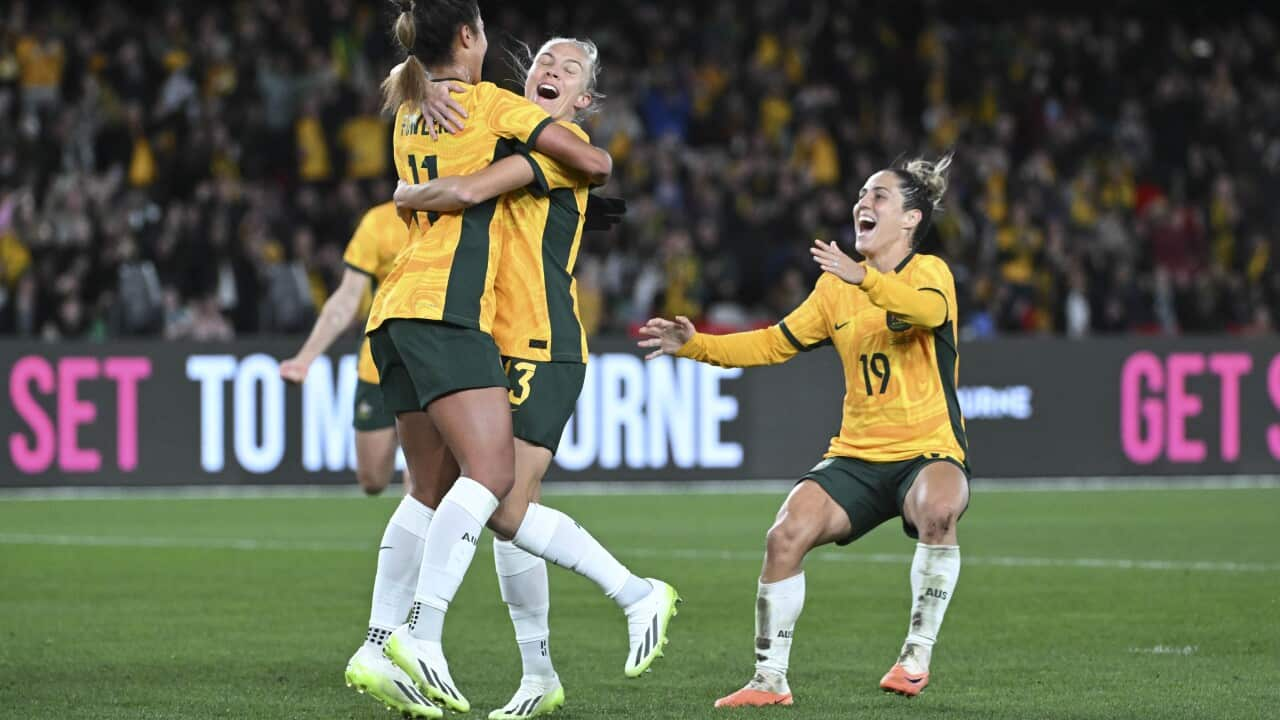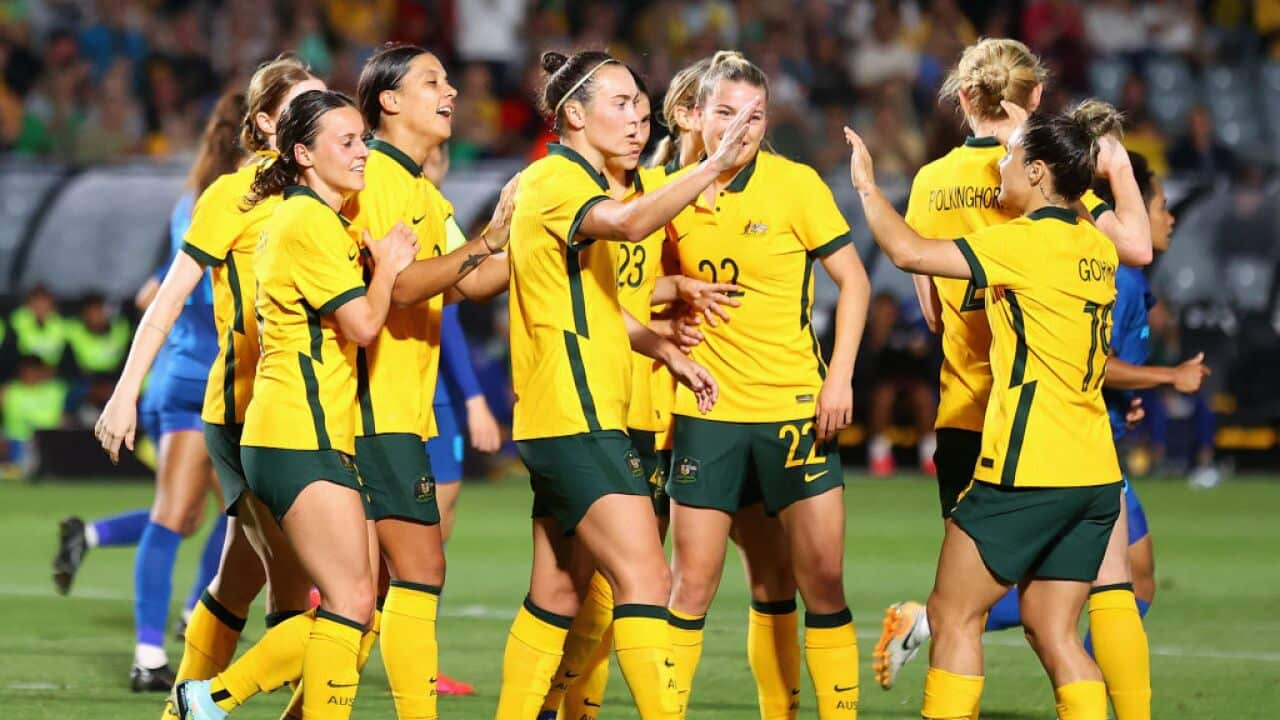Key Points
- Australia's women's national football team, the Matildas, were formed in 1978.
- They were the first Australian national sporting team to go on strike.
- Due to a funding shortfall, they once posed for a nude calendar to raise money.
A huge amount of excitement and pressure surrounds the Matildas as they co-host the FIFA Women's World Cup 2023.
The team, ranked 10th in the world, will be hoping to go beyond the quarter-finals - the furthest they've ever advanced in the tournament.
The Matildas have a rich history, and they've consistently polled as one of the country's most beloved sporting teams.

The Matildas were formed in 1978. Source: AAP / SportPix/Sipa USA
When were the Matildas formed?
Women's football in Australia first showed up in recorded history in the 1920s.
But it wasn't until 1978 that a team formed mostly of players from Sydney played their historic first matches as the country's official women's football team at the first World Women's Invitational Tournament in Taiwan.
A year later the team played New Zealand in their first full 'A' international in Sydney, in a game that finished 2-2.
Julie Dolan, who was the team captain for that game, was bestowed the honour of cap number one for the Matildas.

The Matildas' funding is worlds away from where it was when they formed in 1978. Source: AAP / Sports Press Photo/Sipa USA
The inaugural FIFA Women's World Cup in 1991 massively boosted the women's game internationally, although Australia did not qualify.
There's been seven tournaments since that first one in China and the Matildas have been at every one.

The Matildas celebrate their victory over North Korea in the final of the 2010 AFC Womens Asian Cup Australia defeated North Korea 5-4 in the penalty shootout following a tense 1-1 draw. Source: AAP / Lei yuandong/AP
Their best result in a tournament was fourth place at the 2021 Olympics, beating Team GB to make it through to the semi-finals before losing to Sweden. The team then lost to the US in the fourth-placed playoff.
How the Matildas got their name
You may find it surprising, or jarring, to learn the team's nickname used to be the 'female Socceroos'.
When they qualified for their first World Cup in 1995, a plan was hatched to give them a proper nickname and brand identity, to boost fan engagement and try to secure sponsorship.
SBS conducted a poll through its On the Ball football segment, inviting listeners to pay 25 cents to call in and vote for a new name.
The options were the Soccertoos, Waratahs, Matildas, Lorrikeets and Blue Flyers.

A graphic from SBS' On the Ball segment in the 1990s. Source: SBS News
The winning name didn't come out of nowhere - in 1982 Matilda the winking kangaroo was introduced as the official mascot for the Brisbane Commonwealth Games.

Matilda the winking kangaroo was the mascot for the 1982 Commonwealth Games mascot in Brisbane. Source: AAP / NATIONAL ARCHIVES OF AUSTRALIA
The Matildas once posed for a nude calendar to raise money
Back in 1999, the Matildas had nowhere near the financial backing and public support they have now.
An idea was floated to create a black-and-white nude calendar to generate more funds and 12 players agreed to pose.
They sold tens of thousands of copies but the reaction was mixed and included a fair bit of negativity, former Matilda Katrina Boyd said in 2019.
"It rocked the boat a little bit over here, but we did get a bit of coverage and the word 'Matilda' started to mean something, though probably not for the reasons we wanted," Boyd said.
"I wasn't surprised by the negative reaction. That would still happen today. We were more surprised by how much people were into it, but half of them were blokes, of course."
The Matildas once went on strike
In 2015 the Matildas went on strike over poor pay as they were only receiving $20,000 to play and train in multiple fixtures a year, which was a tenth of a Socceroo salary at the time.
READ MORE

Lisa De Vanna doesn't hold back
It made them the first national team in the country to go on strike.
The strike resulted in them being paid the minimum wage.
The Matildas and the Socceroos are now part of an enterprise bargaining agreement that sees them paid the same amount.
The Matildas have regularly spoken up about equality in the game and recently called out the disparity in prize money.
Investigation into sexual harassment allegations
In 2021 former Matildas striker Lisa De Vanna alleged she was sexually harassed during her international career and told Sydney's Daily Telegraph that one incident involved her Young Matildas team-mates "dry humping" her.
"Have I been sexually harassed? Yes. Have I been bullied? Yes? Ostracised? Yes. Have I seen things that have made me uncomfortable? Yes."
Her accounts were backed up by former team-mate Elissia Carnavas and her ex-manager Rose Garofano, the newspaper reported.
It followed another former player, Rhali Dobson, claiming she had experienced grooming at the beginning of her career.
Football Australia on the same day announced it would investigate and asked players to come forward and make formal complaints, which they had not previously done.
It set up an independent system to investigate and manage any complaints and allegations of misconduct made by players and officials, in partnership with Sport Integrity Australia.
The players put out a group statement and individual comments supporting Lisa but acknowledging they had not experienced harassment and were trying to foster a positive culture.
"We acknowledge the seriousness of Lisa's allegations about the past and we empathise with her for not feeling like she could come forth earlier," the players' statement read.
Football Australia said in April this year the investigation had been closed.
Two complaints were investigated - one was withdrawn and the other was unable to be substantiated.













